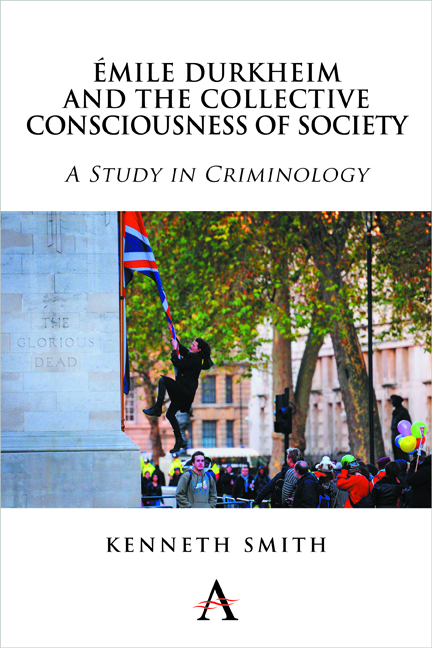Book contents
- Frontmatter
- Dedication
- Contents
- Epigraph
- Preface
- Introduction
- Part I The Concept of the Collective Consciousness of Society
- Part II The Form of the Collective Consciousness
- Part III Durkheim on Crime and Punishment
- Preface to Part III
- Introduction to Part III
- 8 Durkheim on Crime and Punishment in The Division of Labour in Society
- 9 Durkheim on Crime and Punishment in The Rules of Sociological Method
- 10 Interregnum on Suicide (1897)
- 11 Durkheim's Undeservedly Famous ‘Two Laws of Penal Evolution’ Essay (1901)
- 12 Durkheim on Crime and Punishment in Moral Education (1902-03)
- Conclusion to Part III
- Part IV Social Fact or Social Phenomenon? Durkheim's Concept of the Collective Consciousness as a ‘Social Fact’
- Part V Some Problems with Durkheim's Concept of the Common and Collective Consciousness
- Conclusion
- Appendix: On Paying a Debt to Society
- Notes
- References
- Index
9 - Durkheim on Crime and Punishment in The Rules of Sociological Method
from Part III - Durkheim on Crime and Punishment
Published online by Cambridge University Press: 05 October 2014
- Frontmatter
- Dedication
- Contents
- Epigraph
- Preface
- Introduction
- Part I The Concept of the Collective Consciousness of Society
- Part II The Form of the Collective Consciousness
- Part III Durkheim on Crime and Punishment
- Preface to Part III
- Introduction to Part III
- 8 Durkheim on Crime and Punishment in The Division of Labour in Society
- 9 Durkheim on Crime and Punishment in The Rules of Sociological Method
- 10 Interregnum on Suicide (1897)
- 11 Durkheim's Undeservedly Famous ‘Two Laws of Penal Evolution’ Essay (1901)
- 12 Durkheim on Crime and Punishment in Moral Education (1902-03)
- Conclusion to Part III
- Part IV Social Fact or Social Phenomenon? Durkheim's Concept of the Collective Consciousness as a ‘Social Fact’
- Part V Some Problems with Durkheim's Concept of the Common and Collective Consciousness
- Conclusion
- Appendix: On Paying a Debt to Society
- Notes
- References
- Index
Summary
From this point of view the fundamental facts of criminality present themselves to us in an entirely new light.
(Durkheim 1964, 72)In The Rules of Sociological Method, published just two years after The Division of Labour, Durkheim makes his rare acknowledgement that he had changed his mind on the question of the function of crime in society (1964, 72n12). Since this is one of the very few admissions by Durkheim that he ever changed his mind on anything, and this on the subject of crime and punishment too, I think it is worth looking at what he has to say on this key point in some detail.
In The Rules Durkheim says that he originally thought of the criminal as ‘a totally unsociable being, a sort of parasitic element, a strange and unassimilable body, introduced into the midst of society’ (1964, 72), and when he says this he appears to have in mind what he said in The Division of Labour. By the time he came to write The Rules, he now argued that crime – and by extension the criminal – ‘plays a definite role in social life’ (72). The criminal is no longer to be viewed as wholly pathological (1989, 33) but now has a morphological function for society too:
Crime, for its part, must no longer be conceived as an evil that cannot be too much suppressed.
- Type
- Chapter
- Information
- Émile Durkheim and the Collective Consciousness of Society , pp. 104 - 112Publisher: Anthem PressPrint publication year: 2014

